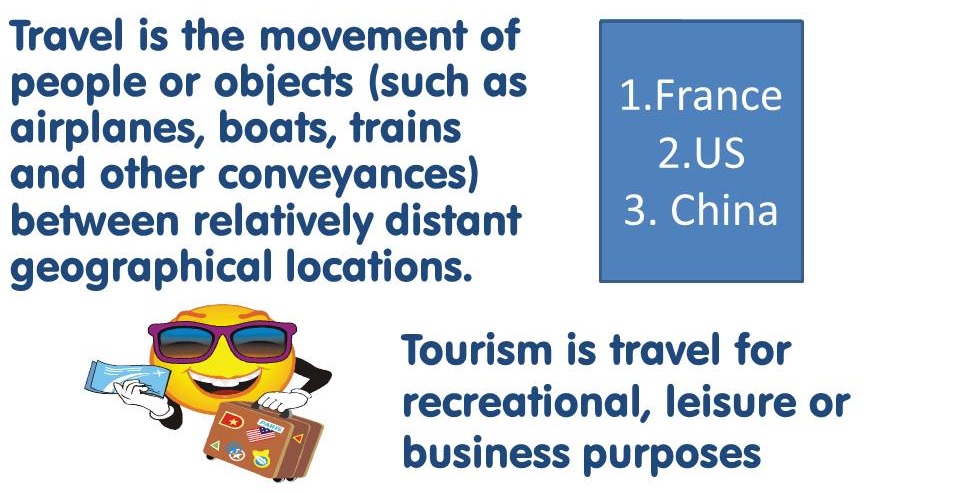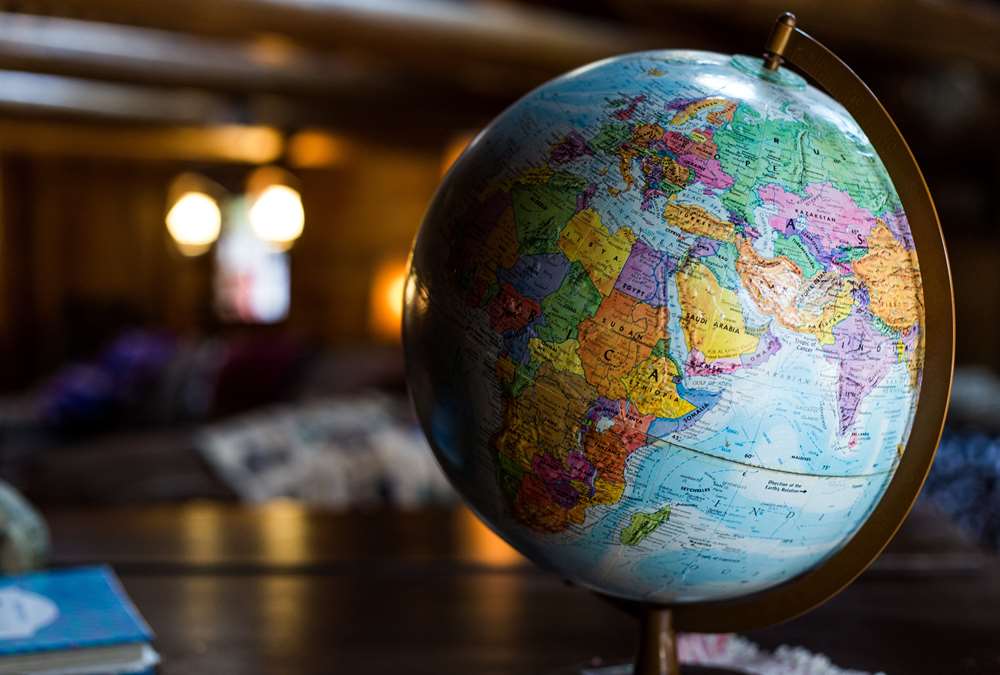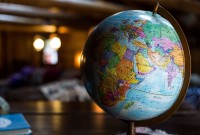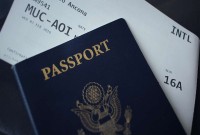- Home
- Business Processes
- Industry Knowledge
- Aerospace Industry
- Automotive Industry
- Banking Domain
- BFSI Industry
- Consumer/ FMCG Industry
- Chemicals Industry
- Engineering & Construction
- Energy Industry
- Education Domain
- Finance Domain
- Hospitality Domain
- Healthcare Industry
- Insurance Domain
- Retail Industry
- Travel and Tourism Domain
- Telecom Industry
- Leadership Skills
- eLearning
- Home
- Domain Knowledge
- Hospitality Domain
- What is Travel & Tourism
What is Travel & Tourism
We all travel and have been a tourist, perhaps many times in our life. Tourism and tourist are so common words that they find mention in newspapers and magazines almost on a daily basis. In spite of its popularity, have you ever deliberated what the definition of travel and tourism is? What components constitute the tourism industry? Who qualifies to be called a tourist? Well, this article attempts to explore the words "travel”, “tourism” and "tourist'- both technically as well as conceptually.
What is the meaning of travel and how it converted into a full-time industry? What are the fundamental concepts pertaining to tourism and what are the characteristics of tourism as an industry? What are the different forms of tourism? In this article, we will explore answers to these basic questions on the travel and tourism industry.
Meaning of Travel
The term travel originates from the Old French word ‘travail’ which meant heavy labor. Travel refers to the movement of people or objects such as airplanes, boats, trains, and other conveyances between various distant geographical locations. Another "etymologically for the world tour as suggested by Theobald in 1994 is that it is derived from the Latin, 'tornare' and the Greek, 'tornos', meaning 'a lathe or circle and the movement around a central point or axis'. This meaning changed in modern English to represent 'one's turn‘ and they suggest the action of movement around a circle. Argument is that a circle represents a starting point, which ultimately returns back to its beginning. Therefore, like a circle, a tour represents a journey in that it is a round-trip, i.e., the act of leaving and then returning to the original starting point, and therefore, one who takes such a journey can be called a tourist
What is Tourism? Defining Tourism
Tourism in our minds is connected with vacation, holidays, pleasure, tours and travels, attractions, historic or scenic places, and going or arriving somewhere. Tourism is prevalent from the pre-industrial age and some common examples are cruises on the Nile River, tours made by wealthy Egyptians, Greeks, and Romans, and the grand tour. People travel for short-term to other places from their normal place of residence and during these temporary visits consume goods and services like transportation, accommodation, etc., and the entire process is known as tourism. The tourism industry revolves around providing enjoyment and pleasurable experiences. Hence the term ‘tourism’ is comprised of several social practices and experiences, signifying a 'departure' from normal mundane life.
According to the W.T.O, Tourism is the movement of people away from their normal place of residence and work for a period of not less than 24 hours and not more than 1 year. United Nations World Tourism Organization (UNWTO) definition is “Activities of persons traveling to, and staying in places outside their usual environment; not more than one consecutive year for leisure, business, and other purposes.”
Walter Hunziker, a Swiss professor who founded the Tourism Research Institute, defines tourism as “the sum of the phenomena and relationships arising from the travel and stay of non-residents, in so far as it do not lead to permanent residence and is not connected to any earning activity".
The League of Nations in 1937 recommended that tourism covers the social activity of those who travel for a period of 24 hours or more in a country other than the one a person usually lives in.
The Rome Conference on Tourism in 1963 adopted the recommendation to replace the term "tourist" with the term "visitor" and defined tourism as a visit "to a country other than one’s own or where one usually resides and works"; for the following reasons:
- Tourism - the activity of temporary visitors staying at least 24 hours for leisure, business, family, mission or meeting
- Excursion - the activity of a temporary visitor staying less than 24 hours but excluding people in transit
The limitation with the above two definitions is that they exclude domestic tourists, although they do mention the day visitor.
The Tourism Society of Britain in 1976 defined tourism as "Tourism is the temporary, short-term movement of people to destinations outside the places where they normally live and work and their activities during their stay at these destinations, including day visits and excursions."
AIEST the oldest international association of scientific and practical experts with a particular interest in tourism in 1981 held that "Tourism may be defined in terms of particular activities selected by choice and undertaken outside the home environment. Tourism may or may not involve overnight stays away from home".
These definitions indicate that definition of tourism has changed and expanded over time to include all types of leisure activity within its scope. We can now simply state that “Tourism is travel for recreational, leisure or business purposes.”
Characteristics of Tourism
Given below are characteristics of tourism as evident from the definitions discussed above. Theses will be helpful in understanding tourism at a conceptual level.
- Tourism involves travel and stay, can also include day trips, business trips, etc.
- There is a movement of tourists from the place of origin to the destination. The tourism industry is tourist-oriented and built entirely upon people.
- Tourism can be international when travel is from one country to another
- Domestic tourism means the travel is within the country
- Tourism is a leisure activity
- Tourism also involves a journey and services like transport, accommodation, catering, and viewing, etc.
- The journey and stay is generally at a site is outside the normal working place or residence
- Tourism is for a short period
- Tourism may involve a variety of experiences. Every individual tourist may have different perceptions about the same products/services of the tourism industry. Tourism is always about the experience that the customer makes.
- The products and services of the tourism and travel industry are perishable meaning they are consumed as soon as they are produced and cannot be stored for the future.
- Tourism is also associated with the status symbol in modem society
- There may be indirect and direct recreational and health benefits of tourism
- Tourism is now emerging as global phenomena
- There exists a variety of tourist types and modes of tourist experiences
- The tourism industry involves tourists, tourist product, types of destinations, attractions, and tour management
- Most of the tourism products are intangible as tourism is about the time spent and the experience made
- Social, economic, and institutional factors affect travelers’ decisions to travel to certain selected destinations that affect these decisions
- Supply-side of the tourism industry is limited and pre-fixed that is surplus capacity based on demand cannot be instantly created like train berths, hotel rooms, etc.

Growth of Tourism as an Industry
There has been an up-trend in tourism over the last few decades. People have a wide range of budgets and tastes, and a wide variety of resorts and hotels have developed to cater for them. As per the reports of the World Tourism Organization, in 2010, there were 940 million international tourist arrivals, with a growth of 6.6% as compared to the year 2009. As per their reports, France and the United States are the most visited countries in terms of the number of international travelers. Economic growth in China triggered tourist inflow and in 2010, China overtook Spain to become the third most visited country. The tourism industry is already the largest of all sectors in terms of world employment and is expected to grow 50 percent faster than in other sectors. It is also an excellent career option and offers various avenues to pursue a fulfilling career.
- The travel and tourism industry’s percentage of world gross domestic product is 9.0 percent.
- The world travel and tourism industry support 266 million jobs (1 in 11 of world jobs).
- The world travel and tourism industry accounts for 6 percent of the world’s exports.
- By 2020 there were over a billion international tourism trips and up to 7 billion domestic trips.
- Tourism is an activity of global importance and significance and a major force in the economy of the world
Related Links
You May Also Like
-
Economic Impact of Tourism Industry
The tourism industry has contributed to the economic growth of a country through factors like industrialization, education, advanced technology, a higher number of qualified professionals, opening up of foreign markets, liberal trade policies, and better advertising and strategic marketing. The income generated helps the national balance of payments, earning revenue through direct taxation, as well as from indirect taxes on goods and services purchased by the tourists.
-
Overview of Hospitality Industry
Hospitality is the act of kindness in welcoming and looking after the basic needs of customers. The hospitality industry is a broad group of businesses that provide services to customers. The industry can be broken down into three basic areas: accommodations, food and beverage, and travel and tourism. Hospitality is actually one facet of the service industry. It primarily involves addressing customer satisfaction and catering to the needs of guests.
-
How does Tourism Industry impact a country? The impact of the tourism industry can be classified into the social & cultural impact, economic impact, and environmental impact. Social & cultural impact signifies the impact which it creates in terms of social changes. The economic impact can be quantified in terms of monetary benefits and overall economic development of the society. Environmental impact refers to the impact on nature and the surrounding areas.
-
Social & Cultural Impact of Tourism
Tourism may have different effects on the social and cultural aspects of life in a particular region depending on the strengths of the region. The effect can be positive or negative. Tours also focus on unique natural or geographical features like the coastline, islands, mountains, health resorts, countryside, etc. At such locations, the provision of tourist services and the pressure of tourists are bound to have impacts on the environment, economy, and local social practices and on the people.
-
We all travel and have been a tourist, perhaps many times in our life. Tourism and tourist are so common words that they find mention in newspapers and magazines almost on a daily basis. In spite of its popularity, have you ever deliberated what the definition of travel and tourism is? What components constitute the tourism industry? Who qualifies to be called a tourist? Well, this article attempts to explore the words "travel”, “tourism” and "tourist'- both technically as well as conceptually.
-
Environmental Impact of Tourism Industry
The environment is the surrounding atmosphere or condition for existence. The impact of tourism on the environment is both positive and negative. This article considers the major issue of the consequences of tourism for the environment. This is a complex area as, whilst tourism is dependent upon environmental quality to attract and support visitors, it also can have a detrimental effect upon those very environments – and their climate.
-
Components of Tourism Industry
The tourism sector is a range of businesses and organizations involved in delivering the tourism product. All the elements of tourism are related and interact; in essence, the tourism industry is a system of customers and suppliers who demand and supply tourism products and services. In relation to tourism, very often you will come across terms like tourism products and services. These components of travel and tourism can be broadly divided into six key areas highlighted below.
-
Wealthy people have always traveled to distant parts of the world, to see great buildings, works of art, learn new languages, and experience new cultures, and to taste different cuisines. There has been an up-trend in tourism over the last few decades and now national or international travel for short breaks is very common. Tourists have a wide range of budgets and tastes, and a wide variety of resorts and hotels have been developed to cater for them.
-
Challenges in the Tourism Industry
Top challenges confronting tourism are taxation, travel marketing, infrastructure issues, and security and cross border regulations. Too many tourism destinations are not prepared for visitors. Tourists or travelers can at times deem travel marketing to be exaggerated. Another major challenge that the tourism industry faces is the fluctuating rates and cost inflation. New challenges seem to arise quickly impacting the industry as a whole.
Explore Our Free Training Articles or
Sign Up to Start With Our eLearning Courses

About Us
Learning
© 2023 TechnoFunc, All Rights Reserved









